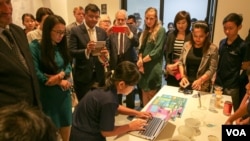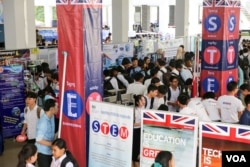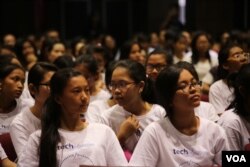Editor’s Note: Cambodia’s tech sector has grown significantly in the last few years. The industry is already estimated to be worth as much as $800 million, employing some 30,000 IT professionals. But to meet the demand of this growing sector, Cambodia needs to aggressively invest in STEM education and careers, says Cambodian-American Allen Dodgson Tan, the managing director of STEM Cambodia, a new NGO that aims to help improve science, technology, engineering, and mathematics education in the country. In August, STEM Cambodia partnered with Microsoft to provide educational mentorship to Cambodian students. In late September, VOA Khmer’s Sophat Soeung sat down with Tan in Washington, DC, to discuss STEM Cambodia’s strategy, its annual science and tech festival, the factors holding back Cambodia’s innovation, and the unique role of Cambodian-Americans in helping transfer tech skills to Cambodia.
SS: How did you get interested in STEM and Cambodia in the first place and how and where did they overlap?
ADT: My every day work is I started a product development lab in Cambodia with the Golden West Humanitarian Foundation and we hire Cambodian engineers to work with us in the lab on product development. What I noticed was how difficult it was to find qualified engineering staff in Cambodia and so that got me digging deeper into the whole issue of STEM education in Cambodia. What I found is that among employers the one universal thing you hear, especially from international employers, is the human resources challenge, especially in the technical fields. Digging into it, I saw that the Ministry of Education under Hang Chuon Naron, the new reformist minister of education, was also aggressively pursuing an increase in STEM capability or capacity in the country in the education system. So, those two things together got me to think about what could I do.
How do you begin to narrow the gap and improve the quality of STEM education and training in Cambodia?
STEM Cambodia is a non-profit organization. It’s a Cambodian NGO registered with the Ministry of Interior, whose sole purpose is to promote science, technology, engineering and mathematics in Cambodia. So, we’re looking at national level programs that increase the awareness of STEM professions and also that help to encourage youth to find those professions interesting or to find their passions in those career fields. So, one of our hallmark programs, kind of a catalyst for even starting this NGO, was what is called the Cambodian Science and Engineering Festival and it happened for the last two years and is recognized by the government of Cambodia as the national event for promoting science, technology, engineering and maths. It actually has been institutionalized by the Ministry of Education. What it is, it's a celebration of all things “STEM”. This is not a new idea. Actually, it was inspired by the founder of US Science and Engineering Festival, a gentleman by the name of Larry Bock, my personal mentor who actually just passed away a few months ago. The US Science and Engineering Festival happens here in Washington, DC and it is the biggest in the world with more than a quarter million people attending that event. But what’s so special about it is that it blends ideas of science, technology, engineering and math with entertainment and fun because it recognizes that for young people to become interested in that, it has to have some level of glamour and it also has to pique curiosity.
Do you think Cambodians are becoming more interested in a STEM career?
Yes, I think we’re definitely making headway in that area. At the end of the first science festival which happened in 2015, I had a young student come up to me and [he] said to me “I didn’t even know that science, technology, engineering and math were related to each other.” And I said “Oh, yes, well, that’s perfect. That’s the purpose of this festival” and he said “Yes, but I’m a third-year university student” and there was such low awareness of STEM that year. Then, next year, when we did it in 2016, we saw an increased participation, but we also saw an increased awareness that those things are subjects that are related and that they relate to real careers. One of the big pushes right now is to look at how it transforms the Cambodian economy from garment manufacturing, which is a pretty low-value type of manufacturing in terms of the type of jobs that it provides. Of course, we’re very happy that those jobs are there but they're relatively low-paying jobs. If you look at Vietnam and Thailand, where there was garment manufacturing at one point and you see a transition to more high-value form of manufacturing and assembly. Vietnam is a great example of that. Vietnam graduates more than 100,000 engineers a year and so you see that they have invested heavily in that aspect of their education system and have benefited from that.
Why does the developing country like Cambodia have to prioritize this type of education right now?
As I briefly mentioned earlier, one of the main barriers to large companies setting up more high value type of operations in Cambodia for them is the human resources challenge, so the lack of engineers, the lack of people who support food science labs, whether they’re lab technicians, whether they’re chemists. Right now in Cambodia, for example, you see a lot of agricultural products, the value is added when they’re exported to Thailand or Vietnam. Right, you see that with fruits. The fruit is grown in Cambodia, exported to Thailand or exported to Vietnam, where it is processed into a higher quality dried fruit for export abroad, which is where that value is added in, but the farmers make little from that. So, the Cambodian economy loses out on these type of things, whether in food manufacturing, or if we’re talking about electronics assembly.
What are the main factors that make STEM education poor in Cambodia?
So, I think there’s a struggle for quality in general because Cambodia is of course a developing nation. There has been very limited resources for education, so I’d like to emphasize this. It’s not that it is anyone’s fault that this has happened because it’s not that it was very high at one time. It’s actually quite good for having started at nothing. It just has some ways to go before it achieves an international standard. Now that said there are exceptions to that, certainly, and Techno [Institute of Technology of Cambodia - ITC] is one of those with a very high-quality program.
Has there been a failure of government to foresee the need for better STEM education?
Right. It’s always a tricky balance how much role the government should play and countries do it to varying degrees. Of course, Germany and some of the more socialist countries are very aggressive in trying to match projected career allocation to the educational system. They try to put kids into tracks very early in their school curriculum and here in the United States, we do almost none of that. You are kind of free to study whatever you like. So, in terms of forcing children into career tracks, the Cambodian government does not do that and I personally as an American feel that’s not the right approach to force children to study certain subjects, but what the Cambodian government is doing in the Ministry of Education is not issuing licenses to new universities because there’s already enough universities in Cambodia with management and accounting degree programs. It’s not issuing new licenses for those types of institutions and encouraging new technical institutions to open up. So, I think that type of approach makes a lot more sense.
What would you do to encourage more Cambodian women to take part?
In Cambodia, we’re blessed that the women of Cambodia are very strong and very smart so they’re very equipped to be in STEM careers. What STEM Cambodia, specifically as an NGO, is doing to address that is by making sure that our programming always includes women role models. So, we have a program that’s rolling out with the British Embassy. It’s a bus that would travel to provincial high schools outside of Phnom Penh and bring the excitement of the science and engineering festival to those high schools. So, we’re very excited about that.
Do you think that cultural factors in Cambodia are holding women back?
I shouldn’t give the wrong impression. I mean I’m not a Cambodian women, so I definitely can’t speak for them, but I have heard anecdotally that there are some perceived barriers that some of these STEM professions will be more a man's thing and maybe perceived that way. So, I do think we face some perception issue there. But with parents, we definitely do [have perception issues]. There’s historical ideas about what a good job is like, what is an office job, a banking job or accounting jobs.
What do you see as the potential role of Cambodian-Americans and the US in improving technical skills and knowledge in Cambodia?
I think Cambodia is very fortunate in that there is this large diaspora who not only have a diversity of experience, but can also at times bring capital in to invest in new startup ideas. I work in overlapping circles with some of the burgeoning tech sector in Cambodia, and there is this new tech sector and entrepreneurship spirit happening around tech in Cambodia. There are some pretty prominent Cambodian-American entrepreneurs currently working in Cambodia in the tech sector doing app programming, doing outsourcing for big US companies, outsourcing their programming to programming banks in Cambodia. I also know examples of French-Cambodians who have returned from France and are now doing that, and Australians.













